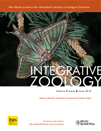
Integrative Zoology
Scope & Guideline
Exploring the Depths of Animal Biology
Introduction
Aims and Scopes
- Behavioral Ecology:
Research exploring the interactions between animal behavior and ecological factors, including studies on social structures, foraging strategies, and reproductive behaviors. - Conservation Genetics:
Focus on the genetic diversity and evolutionary history of species, providing insights into conservation efforts and the management of endangered species. - Physiological Adaptations:
Investigations into how animals adapt physiologically to their environments, including studies on thermal tolerance, metabolic processes, and immune responses. - Urban Ecology:
Examining the impacts of urbanization on wildlife, including the effects of habitat modification, human activity, and anthropogenic stressors on animal populations. - Microbiome Studies:
Research on the role of gut microbiota in animal health, behavior, and ecology, highlighting the interplay between hosts and their microbial communities. - Evolutionary Biology:
Studies investigating the evolutionary mechanisms and phylogenetic relationships among species, including morphological and genetic analyses. - Ecological Networks:
Exploring the complex interactions within ecological communities, such as predator-prey dynamics, mutualism, and the role of animals in seed dispersal.
Trending and Emerging
- Climate Change Impact Studies:
Research examining how climate variables affect animal behavior, distribution, and community dynamics is on the rise, highlighting the urgent need to understand ecological responses to global change. - Microbiome and Health Interactions:
Emerging studies focus on the interactions between animal hosts and their microbiomes, exploring how these relationships influence health, behavior, and ecological roles. - Technological Innovations in Wildlife Monitoring:
The use of advanced technologies such as drones, eDNA metabarcoding, and AI-based monitoring systems is increasingly prevalent, allowing for more efficient data collection and analysis in wildlife studies. - Urban Wildlife Dynamics:
Research on how urban environments affect wildlife behavior, community interactions, and adaptations is gaining momentum, reflecting the growing importance of urban ecology. - One Health Approach:
The integration of human, animal, and environmental health research is trending, emphasizing the interconnectedness of health outcomes across species and ecosystems. - Behavioral Plasticity and Adaptation:
Studies focusing on how animals adapt their behaviors to changing environments, including responses to anthropogenic pressures, are becoming more prominent.
Declining or Waning
- Traditional Morphology Studies:
Research centered on classical morphological studies has decreased, possibly as a result of the growing emphasis on genetic and molecular techniques that provide deeper insights into evolutionary relationships. - Laboratory-Based Behavioral Studies:
There has been a noticeable decline in studies focusing solely on laboratory behavioral experiments, as more researchers are opting for field-based observations that consider ecological contexts. - Generalized Conservation Strategies:
Publications focusing on broad conservation strategies without specific case studies are waning, with a shift towards targeted, species-specific conservation research that incorporates genetic and ecological data. - Static Ecological Models:
The reliance on traditional ecological models that do not account for dynamic environmental changes is decreasing, as researchers increasingly utilize more sophisticated, adaptive modeling techniques.
Similar Journals
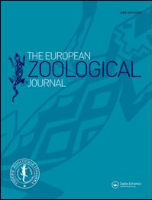
European Zoological Journal
Elevating the Study of Animal Sciences Across EuropeEuropean Zoological Journal, published by Taylor & Francis Ltd, is an esteemed open-access publication dedicated to advancing the exciting field of zoology. Since its inception in 2017, this journal has progressively established itself as a vital resource for researchers, professionals, and students alike. With its Q2 ranking in Animal Science and Zoology as of 2023, the journal ranks in the 69th percentile among its peers, showcasing its influence and contribution to the discipline. The journal’s broad scope covers a wide range of topics within zoology, aiming to foster an understanding of animal biology and conservation efforts. As an open-access journal, it not only enhances the dissemination of knowledge but also encourages collaborative research across global communities. Situated in the United Kingdom, the European Zoological Journal invites submissions that contribute to the evolving discourse in animal sciences, and endeavors to support the scientific community in addressing pressing ecological challenges.
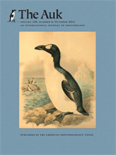
Ornithology
Elevating Understanding of Our Feathered Friends.Ornithology, published by Oxford University Press Inc, is a premier journal dedicated to the field of avian biology, offering a platform for researchers, professionals, and students to share groundbreaking findings in the study of birds. With an impressive impact factor and ranking in the Q1 quartile for both Animal Science and Zoology, as well as Ecology, Evolution, Behavior, and Systematics, Ornithology serves as a vital resource for advancing our understanding of avian species and their ecological roles. The journal allows open access viewing, broadening the reach and impact of published research. Covering comprehensive studies from 1982 to 2023, it facilitates collaboration and innovation within the global ornithological community. Engaging with Ornithology not only elevates your research profile but also contributes to the rich tapestry of knowledge concerning the world's diverse bird populations.
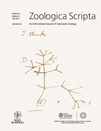
ZOOLOGICA SCRIPTA
Exploring the intricacies of biodiversity and evolution.Zoologica Scripta, published by Wiley, stands as a distinguished journal within the fields of Animal Science and Zoology, Ecology, Evolution, Behavior and Systematics, Genetics, and Molecular Biology. With its inception dating back to 1971 and a convergence year extending to 2024, this journal consistently provides a platform for high-quality research, earning a Q1 ranking in two key categories and solid performance in additional fields, as evidenced by its significant Scopus rankings and impressive percentiles. Notably, it ranks 36 out of 490 journals in Animal Science and Zoology, placing it in the 92nd percentile. While Zoologica Scripta operates under a traditional access model, its rigorous peer-review process ensures that only the most impactful studies make their way into its pages. With a focus on advancing our understanding of biodiversity and evolutionary processes, this journal is indispensable for researchers, professionals, and students committed to the ongoing exploration of animal sciences and ecological studies.

ZOOLOGICAL SCIENCE
Empowering Wildlife Understanding and PreservationZoological Science, published by the Zoological Society of Japan, is a leading journal dedicated to the fields of animal science and zoology. With its ISSN 0289-0003, this respected publication has established itself as a prominent source of scientific research, attaining a commendable Q2 ranking in the 2023 category of Animal Science and Zoology. Spanning over three decades, from 1992 to 2024, the journal offers a valuable platform for scholarly articles that explore various aspects of zoology, including ecology, behavior, and evolutionary biology. Although it operates under a traditional subscription model, its contributions are supported by a robust community of researchers and professionals who value its insights. The journal strives to foster academic discourse and insights that drive understanding and conservation of wildlife, making it an essential resource for students and established experts alike. The publishing headquarters located in Tokyo, Japan, further enhances its international reach and influence in zoological studies.
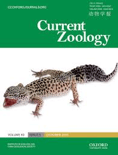
Current Zoology
Unveiling Insights in Animal Biology and ConservationCurrent Zoology, published by Oxford University Press, is a leading open-access journal dedicated to advancing the field of zoology and animal science since its establishment in 2009. With an impressive Q1 ranking in Animal Science and Zoology as of 2023, the journal maintains a prominent position within the academic community, supported by a ranking of #138 out of 490 in Scopus. Current Zoology serves as a vital platform for researchers, professionals, and students, showcasing high-quality research that spans a broad array of topics within the domain of zoology. This journal is characterized by its rigorous peer-review process, ensuring the dissemination of credible and impactful findings that contribute to the understanding of animal biology and conservation efforts. The open-access model enhances accessibility, allowing a wider audience to engage with the pivotal research being conducted in this dynamic field. Processing all manuscripts in an efficient manner and featuring articles that push the boundaries of current knowledge, Current Zoology is your gateway to explore innovative discoveries and trends in zoology.

Zoological Letters
Unlocking the mysteries of the animal kingdom.Zoological Letters, published by BMC, is a premier open-access journal dedicated to advancing the field of zoology and animal science. Since its inception in 2015, the journal has established itself as a critical platform for researchers to disseminate their findings and contribute to the ongoing discourse in this vibrant discipline. Based in the United Kingdom, Zoological Letters boasts an impressive Q2 category ranking in Animal Science and Zoology for 2023, placing it within the top 25% of journals in the field. With a Scopus rank of #116 out of 490, representing the 76th percentile, it showcases the influence and reach of the research published within its pages. The journal’s substantial focus on contemporary issues and methodologies ensures that it is a vital resource for academics, professionals, and students alike, fostering innovation and collaboration throughout the global scientific community. Open access since 2015, Zoological Letters is committed to making scientific knowledge accessible, thus enhancing the visibility and impact of research in zoological studies.

ACTA ETHOLOGICA
Advancing the Frontiers of Animal Behavior and EcologyACTA ETHOLOGICA, published by Springer Heidelberg, is a leading journal in the fields of Animal Science and Zoology, as well as Ecology, Evolution, Behavior, and Systematics. With an ISSN of 0873-9749 and an E-ISSN of 1437-9546, this journal has established itself as a notable platform for innovative research and review articles since its inception in 1998. As of 2023, it holds a Category Quartile of Q3 in both its primary categories, showcasing its commitment to advancing knowledge within these scientific domains. The journal aims to facilitate the dissemination of cutting-edge research on animal behavior and ecology, fostering collaboration among researchers, professionals, and students. While it does not currently offer Open Access options, ACTA ETHOLOGICA remains crucial for those looking to stay informed about the latest developments and trends in ethology. For inquiries, the journal's editorial office is located at Tiergartenstraße 17, D-69121 Heidelberg, Germany.

CANADIAN JOURNAL OF ZOOLOGY
Advancing the Frontiers of Animal Science and EcologyWelcome to the Canadian Journal of Zoology, a leading academic journal in the fields of Animal Science and Zoology as well as Ecology, Evolution, Behavior and Systematics. Published by Canadian Science Publishing since 1965, this esteemed journal serves as a vital platform for researchers, professionals, and students to disseminate and engage with significant findings in zoological and ecological research. With an impact factor placing it in the Q2 category and rankings reflecting its influence (201/490 in Animal Science and Zoology; 372/721 in Ecology), the journal is committed to advancing the understanding of animal biology and environmental interactions. Although currently not an open access publication, it provides comprehensive resources and studies that are crucial for the academic community. Based in Ottawa, Canada, the journal continues to push the boundary of knowledge right up to 2024 and beyond, making it an essential resource for anyone dedicated to the life sciences.

Avian Biology Research
Advancing avian science through rigorous research.Avian Biology Research, published by SAGE PUBLICATIONS LTD, is a leading journal dedicated to advancing the study of avian species through high-quality, peer-reviewed research. With an ISSN of 1758-1559 and an E-ISSN of 1758-1567, this journal has established itself as a vital resource within the fields of Animal Science and Zoology, as well as Ecology, Evolution, Behavior, and Systematics. The journal is currently ranked Q3 in both categories according to the 2023 release of the category quartiles, and it contributes significantly to the global understanding of avian biology, including behavior, physiology, and conservation efforts. Positioned within the competitive landscape of the Scopus rankings, it finds itself amidst a diverse array of research, with medical and environmental implications. As an open-access journal, Avian Biology Research ensures greater accessibility to its contents, fostering disseminative opportunities for researchers, professionals, and students alike. With a publication window spanning from 2008 to 2024, it continues to be an invaluable platform for the dissemination and dialogue of avian research, thereby enlightening future inquiries and driving scientific advancements in this crucial area of biology.
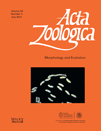
ACTA ZOOLOGICA
Contributing to the Future of Zoological ResearchACTA ZOOLOGICA, published by WILEY, is a distinguished journal that serves as an essential resource for researchers and professionals in the fields of Animal Science, Zoology, Cell Biology, and Ecology. With its ISSN 0001-7272 and E-ISSN 1463-6395, this journal has been contributing to the scientific community since 1920 and continues to explore new dimensions in zoological research. As of 2023, it holds an impactful position with a Q3 ranking in Animal Science and Zoology as well as Ecology, Evolution, Behavior and Systematics, signifying its relevance and emerging influence in these domains. Although it is not an Open Access journal, ACTA ZOOLOGICA remains committed to disseminating high-quality research and facilitating scholarly discussions among its audience. The journal aims to publish original articles, reviews, and critical findings that enhance understanding of animal biology and conservation, addressing global ecological challenges. Its rankings in Scopus further underscore its scholarly reputation, making it a valuable addition to the libraries of institutions and individuals alike.